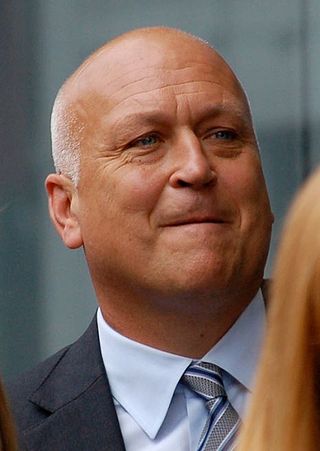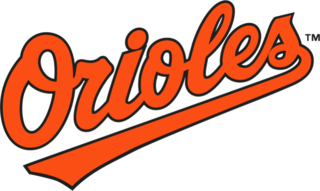
Calvin Edwin Ripken Jr., nicknamed "the Iron Man", is an American former baseball shortstop and third baseman who played his entire 21-season career in Major League Baseball (MLB) for the Baltimore Orioles (1981–2001). One of his position's most productive offensive players, Ripken compiled 3,184 hits, 431 home runs, and 1,695 runs batted in during his career, and he won two Gold Glove Awards for his defense. He was a 19-time All-Star and was twice named American League (AL) Most Valuable Player (MVP), in 1983 and 1991. Ripken holds the record for consecutive games played (2,632), having surpassed Lou Gehrig's streak of 2,130 which had stood for 56 years and which many deemed was unbreakable. In 2007, he was elected to the Baseball Hall of Fame in his first year of eligibility with 98.53% of votes, the sixth-highest election percentage ever to-date.

The 2001 Baltimore Orioles season was the 101st season in Baltimore Orioles franchise history, the 48th in Baltimore, and the 10th at Oriole Park at Camden Yards. They failed to improve on their 74–88 (.457) record from the previous year with a 63-98 record, and missed the postseason for the 4th straight season. It would also be the final season for Hall of Famer Cal Ripken Jr.
The 2000 Baltimore Orioles season was the 100th season in Baltimore Orioles franchise history, the 47th in Baltimore, and the 9th at Oriole Park at Camden Yards. The Orioles finished fourth in the American League East with a record of 74 wins and 88 losses.
The 1998 Baltimore Orioles season was the 98th season in Baltimore Orioles franchise history, the 45th in Baltimore, and the 7th at Oriole Park at Camden Yards.
The 1997 Baltimore Orioles season was the 97th season in Baltimore Orioles franchise history, the 44th in Baltimore, and the 6th at Oriole Park at Camden Yards.
The 1995 Baltimore Orioles season was the 95th season in Baltimore Orioles franchise history, the 42nd in Baltimore, and the 4th at Oriole Park at Camden Yards. It involved the Orioles finishing third in the American League East with a record of 71 wins and 73 losses.
The 1992 Baltimore Orioles season was the 92nd season in Baltimore Orioles franchise history, the 39th in Baltimore, and the inaugural season at Oriole Park at Camden Yards, after having played almost 40 years at Memorial Stadium where they still play to this day. It involved the Orioles finishing third in the American League East with a record of 89 wins and 73 losses.
The 1990 Baltimore Orioles season was the 90th season in Baltimore Orioles franchise history, the 37th in Baltimore, and the 37th at Memorial Stadium. The Orioles finished fifth in the American League East with a record of 76 wins and 85 losses.
The 1989 Baltimore Orioles season was the 89th season in Baltimore Orioles franchise history, the 36th in Baltimore, and the 36th at Memorial Stadium. The Orioles finished second in the American League East with a record of 87 wins and 75 losses. The team was known as the Comeback Kids as they rebounded from the 54 wins and 107 losses of the 1988 season. The season also took on the "Why Not?!" promotional slogan as the team's pursuit of the pennant went down to the final series of the regular season. The Orioles went into the three-game season finale against the first place Toronto Blue Jays down by one game in the AL East standings and needing either a sweep to win the AL East championship, or two wins to force a one-game playoff. The Blue Jays won the first two games of the series, clinching first place on the penultimate game of the season.
The 1988 Baltimore Orioles season was the 88th season in Baltimore Orioles franchise history, the 35th in Baltimore, and the 35th at Memorial Stadium. The Orioles had the worst start to a season in modern American baseball history. The Orioles finished seventh in the American League East, reduced to a record of 54 wins and 107 losses just five seasons after winning the World Series. The season is most notable for the 0–21 start that lasted from April 4 to April 28. Manager Cal Ripken, Sr. was fired after an 0–6 start and replaced by Hall of Famer Frank Robinson. The Orioles won their first game of the year against the Chicago White Sox at Comiskey Park on April 29. The most runs allowed during the season was 15 in a game on June 19 while the most runs scored was 12 in a game on May 31. Orioles owner Edward Bennett Williams died in August of that year.
The 1985 Baltimore Orioles season was the 85th season in Baltimore Orioles franchise history, the 32nd in Baltimore, and the 32nd at Memorial Stadium. The Orioles finished fourth in the American League East with a record of 83 wins and 78 losses. The Orioles led Major League Baseball in home runs (214) and slugging percentage (.430).
The 1984 Baltimore Orioles season was the 84th season in Baltimore Orioles franchise history, the 31st in Baltimore, and the 31st at Memorial Stadium. The Orioles finished fifth in the American League East with a record of 85 wins and 77 losses.

The 1983 Baltimore Orioles season was the 83rd season in Baltimore Orioles franchise history, the 30th in Baltimore, and the 30th at Memorial Stadium. The Orioles won the Major League Baseball World Series after finishing first in the American League East with a record of 98 wins and 64 losses, The Orioles won the championship by beating the Philadelphia Philles, 4–1, in the 1983 World Series. The season was the Orioles' first in nearly 15 years without manager Earl Weaver, who retired after the Orioles missed the playoffs in the final game of the 1982 season. The Orioles replaced the future Hall of Famer Weaver with Joe Altobelli. The World Series victory was the Orioles' first championship since 1970 and their most recent to date.
The 1982 Baltimore Orioles season was the 82nd season in Baltimore Orioles franchise history, the 29th in Baltimore, and the 29th at Memorial Stadium. The Orioles finished second in the American League East to the eventual AL Champions Milwaukee Brewers. They finished with a record of 94 wins and 68 losses. For the second consecutive season, the Orioles recorded the most grand slams in MLB, hitting eight in 1982. This was long time Oriole manager and future Hall of Famer Earl Weaver's last season managing the Orioles until he returned to manage them from 1985 to 1986.
The 1981 Baltimore Orioles season was the franchise's 28th season based in Baltimore and 81st overall season as a member of the American League. Games were suspended for 50 days due to the 1981 Major League Baseball strike, causing a split season. The Orioles competed as members of the American League East, finishing second in the first half of the season and fourth in the second half of the season; their overall record was 59 wins and 46 losses. The Orioles hit five grand slams, the most in MLB in 1981.
The 1978 Baltimore Orioles season was the 78th season in Baltimore Orioles franchise history, the 25th in Baltimore, and the 25th at Memorial Stadium. The Orioles finished fourth in the American League East with a record of 90 wins and 71 losses.
The 1995 Texas Rangers season was the 35th of the Texas Rangers franchise overall, their 24th in Arlington as the Rangers, and their 2nd season at The Ballpark in Arlington. The Rangers finished third in the American League West with a record of 74 wins and 70 losses. They also hosted the 1995 Major League Baseball All-Star Game.
The 1981 Kansas City Royals season was their 13th in Major League Baseball. The 1981 season was interrupted by a players strike from June 12 to July 31, and resumed on August 10. Major League Baseball officials decided to split the season, and the division winners of both halves would advance to the playoffs. The Royals were 20–30 and in fifth place in the American League West when the strike began, but won the second half with a 30–23 mark. Dick Howser replaced Jim Frey as manager on August 31. Kansas City's overall 50-53 record made the Royals the first team in MLB history to reach the postseason with a losing mark. Kansas City lost to the first half American League West winner Oakland Athletics 3–0 in the ALDS.
The 1991 Detroit Tigers season was the team's 91st season and the 80th season at Tiger Stadium. The Tigers finished in a tie for second place in the American League East with a record of 84–78 (.519). They outscored their opponents 817 to 794. The Tigers drew 1,641,661 fans to Tiger Stadium in 1991, ranking 12th of the 14 teams in the American League.
The 1993 Detroit Tigers season was the team's 93rd season and the 82nd season at Tiger Stadium. The team wasn't expected to do much after a sixth-place finish the previous season. The pitching staff was riddled with inconsistencies, but the Tigers were in first place as late as June 25 before a 10-game losing streak ended their hopes of a turnaround. This would be the Tigers last winning season of the 20th century, the next time the team finished with the winning record was 2006, by then the team had been playing in Comerica Park for 7 years.



